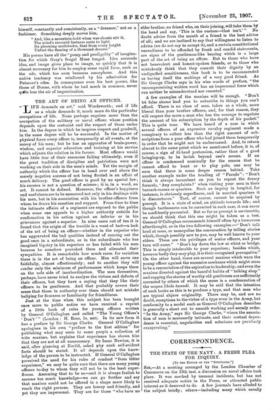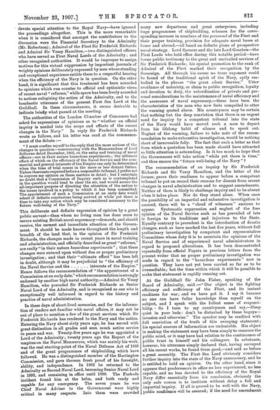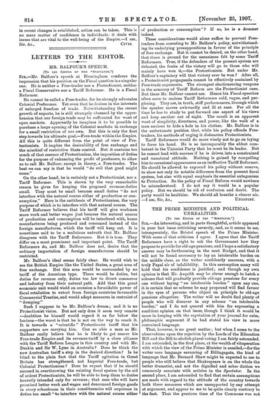CORRESPONDENCE.
THE STATE OF THE NAVY : A FRESH PLEA FOR INQUIRY.
LT0 TEE EDITOR OF TUE " SPECTATOR."]
SIR,-At a meeting arranged by the London Chamber of Commerce on the 13th inst. a discussion on naval affairs took place. It was marked by unusual incidents, but has not received adequate notice in the Press, or attracted public interest as it deserved to do. A few journals have alluded to the subject briefly; others—including many which , usually • devote special attention to the Royal Navy—have ignored the proceedings altogether. This is the more remarkable when it is considered that amongst the contributors to the discussion were the Financial Secretary to the Admiralty
(Mr. Robertson) ; Admiral of the Fleet Sir Frederick Richards and Admiral Sir Vesey Hamilton,—two distinguished officers who have served as First Naval Lords of the Admiralty ; and other recognised authorities. It would be improper to assign motives for this virtual suppression by important journals of weighty opinions deliberately expressed by men whose standing and exceptional experience entitle them to a respectful hearing when the efficiency of the Navy is in question. On the other hand, it is significant that this treatment has been accorded to opinions which run counter to official and optimistic views of recent naval " reforms," while space has been freely accorded to notices eulogising the action of the Admiralty, and to the bombastic utterance of the present First Sea Lord at the Guildhall. In these circumstances, it seems desirable to indicate briefly what passed at the meeting.
The authorities of the London Chamber of Commerce had asked for expressions of opinions as to " whether an official
inquiry is needed into the scope and effects of the recent changes in the Navy." In reply Sir Frederick Richards
wrote as follows, and his letter was read at the commence- ment of the debate :-
" I must confine myself to the reply that the more serious of the changes in question—commencing with the Memorandum of Lord Selborne dated December, 1902, on the entry and training of naval officers—are in their nature hazardous experiments ; the ultimate effect of which on the efficiency of the Naval Service and the com- mercial and general interests of the Empire can only be determined when the time of trial comes in the more or less distant future. Unless thereunto required before a responsible tribunal, I prefer not to express my opinion on these matters in detail ; but I entertain no doubt that a Commission of Inquiry such as is contemplated in the question would tend to clear the air, and would assure the all-important purpose of directing the attention of the nation to the issues involved in a policy to which it has been committed. The appointment of such a Commission at an early date would admit of definite conclusions being arrived at while yet there is time to take any action which may be considered necessary to the future well-being of the Navy."
This deliberate and definite expression of opinion by a great public servant—than whom no living man has done more to secure existing British naval supremacy—demands, and should receive, the earnest and immediate attention of the Govern- ment. It should be made known throughout the length and breadth of the land that, in the opinion of Sir Frederick Richards, the changes made in recent years in naval training and administration, and officially described as great "reforms," are really " in their nature hazardous experiments" ; that these changes were entered upon without due or proper preliminary investigation ; and that their "ultimate effect" has been left in doubt, although it may be prejudicial to "the efficiency of
the Naval Service and the interests of the Empire."
Hence follows the recommendation of "the appointment of a Commission at an early date," which recommendation is strongly endorsed by another high naval authority,—Admiral Sir Vesey Hamilton, who preceded Sir Frederick Richards as Senior Naval Lord of the Admiralty, and is recognised as one who is exceptionally well informed in regard to the history and practice of naval administration.
In these days of short-lived memories, and for the informa- tion of readers not familiar with naval affairs, it may not be out of place to mention a few of the great services which Sir Frederick Richards has rendered to the Navy and the nation. Entering the Navy about sixty years ago, he has served with great distinction in all grades and seen much active service in peace and war. Twenty-five years ago he was appointed a Lord of the Admiralty ; twenty years ago the Report of the umpires on the Naval Manoeuvres, which was mainly his work, was the real starting-point of the Naval Defence Act of 1889 and of the great programmes of shipbuilding which have followed. He was a distinguished member of the Hartington Commission, and gave thereon fresh proof of his foresight, ability, and independence. In 1892 he returned to the Admiralty as Second Naval Lord, becoming Senior Naval Lord in 1893, and remaining in office until 1899. The Fashoda incident found him at the helm, and both ready and capable for any emergency. The seven years he was Chief Naval Adviser to the Government were highly critical in many respects. Into them were crowded
many new departures and great enterprises, including huge programmes of shipbuilding, schemes for the corre- sponding increase in numbers of the personnel of the Fleet and their proper training, provision for adequate naval bases at home and abroad,—all based on definite plans of prospective naval strategy. Lord Spencer and the late Lord Goschen—the First Lords who held office during this notable peribd—have borne public testimony to the great and unrivalled services of Sir Frederick Richards ; his special promotion to the rank of Admiral of the Fleet marked their recognition by the Sovereign. All through his career no truer exponent could be found of the traditional spirit of the Navy, aptly em- bodied in the phrase "the great silent Service." Utter avoidance of notoriety, or claim to public recognition, loyalty and devotion to duty, the subordination of private and per- sonal considerations to the maintenance of naval efficiency and the assurance of naval supremacy,—these have been the characteristics of the man who now feels compelled to utter the warning quoted above. His countrymen may be certain that nothing but the deep conviction that there is an urgent need for inquiry by a competent tribunal into the state of the Navy would have moved such a man to depart from his lifelong habit of silence and to speak out. Neglect of the warning, failure to take note of the recom- mendation to make exhaustive investigation, would be nothing short of inexcusable folly. The fact that such a letter as that from which a quotation has been made should have attracted so little attention is astounding. Is it too much to hope that the Government will take action "while yet there is time," and thus ensure the "future well-being of the Navy " ?
The recommendation of an inquiry by Sir Frederick Richards and Sir Vesey Hamilton, and the letter of the former, prove their readiness to appear before a competent tribunal to put on record their reasons for dissent from recent changes in naval administration and to suggest amendments. Neither of them is likely to challenge inquiry and to be absent when it takes place. Nor do they stand alone. When once the possibility of an impartial and exhaustive investigation is assured, there will be a " cloud of witnesses " anxious to appear. Systematic suppression and neglect of the free opinion of the Naval Service such as has prevailed of late is foreign to its traditions and injurious to the State. Equally contrary to precedent is the introduction of drastic changes, such as have marked the last five years, without full preliminary investigation by competent and representative Committees whose duty it is to ascertain the opinions of the Naval. Service and of experienced naval administrators in regard to proposed alterations. It has been demonstrated repeatedly from official Papers in previous letters from the present writer that no proper preliminary investigation was made in regard to the "hazardous experiments" now in question. They have not yet been carried so far as to be irremediable; but the time within which it will be possible to make that statement is rapidly running out.
At the Guildhall Sir John Fisher, speaking of the Board of Admiralty, said :—" Our object is the fighting efficiency and sufficiency of the Fleet, and its instant readiness for war; and we have got it. I say it because no one can have fuller knowledge than myself on the subject, and I speak with the fullest sense of responsi- bility. • So I turn to my countrymen and say,—Sleep quiet in your beds : don't be disturbed by these bogeys— invasion and otherwise." The speaker may be credited with full conviction of the truth of this sweeping statement; his special sources of information are undeniable. His object in making the statement may have been simply to reassure the public mind, or it may have had relation to the continuance of public trust in himself and his colleagues. In substance, however, his utterance simply declared that, having surveyed all his recent works, he found them good,—and said so before a great assembly. The First Sea Lord obviously considers further inquiry into the state of the Navy unnecessary, and he is entitled to hold an opinion. On the other hand, since it appears that predecessors in office no less experienced, no less capable, and no less devoted to the efficiency of the Royal Navy differ essentially from his conclusion, obviously the only safe course is to institute without delay a full and impartial inquiry. If all is proved to be well with the Navy, public confidence will be assured; if the need for amendment
in recent changes is established, action can be taken. This is no mere matter of confidence in individuals: it deals with issues that are vital to the well-being of the Empire.—I am, Sir, &c.,




















































 Previous page
Previous page